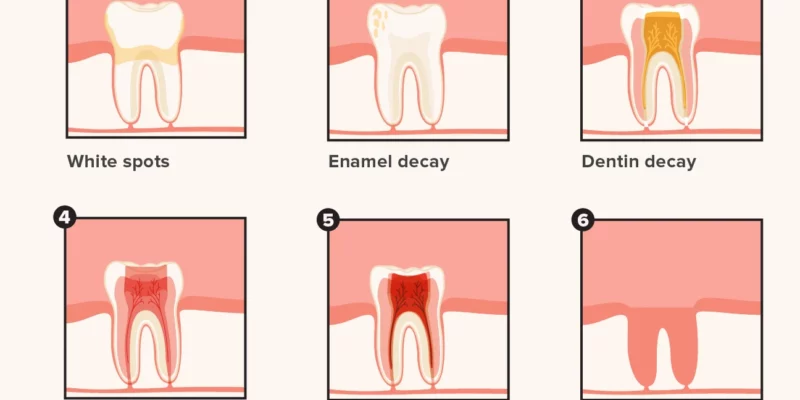In this article:
- What tooth decay is and how it occurs
- Answers to common questions about tooth decay and cavities
- What can happen if tooth decay is not treated
- Ways you can prevent tooth decay and treat it if you already have it
Tooth decay is a disease that damages and breaks down teeth.
Your teeth have a hard, outer layer, called enamel. A inner layer called dentin and a center, which contains the nerves and blood vessels, known as the pulp chamber.
Tooth decay can affect each layer of your tooth, and the more layers that are affected, the worse the damage.
What causes tooth decay?
Sticky film of bacterial called plaque covers your teeth. When your teeth are covered by plaque, the bacteria in the plaque use sugar in food and drinks to make acid. This acid attacks your tooth enamel. Eventually, your enamel can break down from theses acids and cavities can start to form. Once a cavity forms, you cannot reverse it. Dentist must repair cavity, usually with a filling.
If you do not treat your cavity, you may feel pain. And the infection can spread to other parts of your mouth. You may even lose teeth. People with tooth pain may have trouble eating and sleeping and may miss days of work or school.
Signs and symptoms of tooth decay
- brown, black or white spots on your teeth
- a visible hole in your tooth
- bad breath that doesn’t go away with brushing or mouth rinse
- loose fillings
- sensitivity to heat or cold
- tooth pain
You may not notice any signs or symptoms at all. So it’s important to see your dentist regularly. He or she will examine your teeth and take x-rays if needed.
Common places where decay forms
Tooth decay often occurs between teeth and in the grooves of back teeth, where bits of food collect. Toothbrush bristles often do not get into these grooves. Back teeth are also harder to keep clean because they are not as easy to reach. Another place decay can form is at the tooth root. Cavities there may go below the gumline.
People of all ages can get tooth decay
Your risk may increase if you:
- have sugary foods and drinks often throughout the day
- have a dry mouth all or most of the time
- have weak enamel due to family history or childhood illness
- do not practice good oral hygiene habits
The bacteria that cause tooth decay can also be passed from one mouth to another by kissing, sharing a cup or spoon or anything else that carries saliva. For this reason, you should not share toothbrushes with anyone.
Treating tooth decay
Treatment depends on the size and location of the decay. Your dentist can explain what treatment is best, depending on how much the decay there is.
- For decay that is caught early, a fluoride treatment may be all that is needed. Fluoride is a natural mineral that can help protect your tooth enamel and reverse early signs of decay.
- If decay has formed a cavity, you’ll need a filling.
- If the cavity is large, you may need a crown.
- If the cavity has caused the pulp of your tooth to be infected or inflamed, you may need root canal therapy.
- For a tooth badly damaged by a cavity, it may need to be removed and replaced with an implant or bridge.
What you can do to lower your risk of tooth decay
- Brush your teeth with a fluoride toothpaste two times a day and for two minutes each time
- Clean between your teeth everyday with floss or another between the teeth cleaner
- Limit how often you snack and sip on sugary foods and drinks
- Drink water that contains fluoride. Tap water often has added fluoride to keep your teeth strong
- Visit your dentist regularly for exams and professional teeth cleanings.
- Dental sealants applied to back teeth are a treatment options that can lower your risk even more. Dental sealants acts as a barrier, protecting enamel by sealing out bacteria and bits of food that can get stuck.
Do you need dental exam to check for Tooth Decay in South Jersey?
Rapha Dental is family dentist office that treats tooth decay in South Jersey. Call us today at 856-829-8668 or book an appointment online yourself.
We look forward to meeting with you!
Copyright @ American Dental Association

